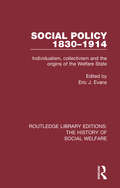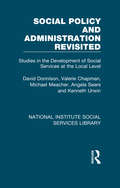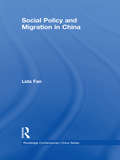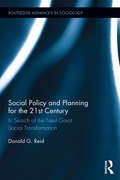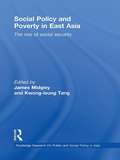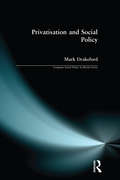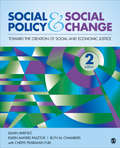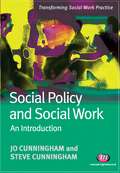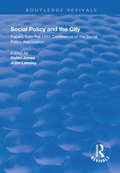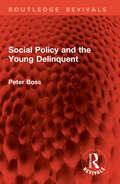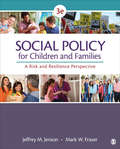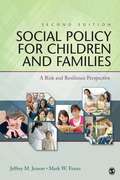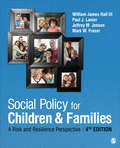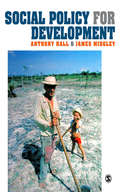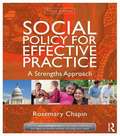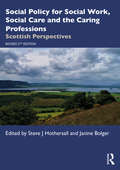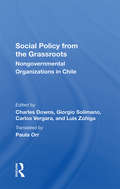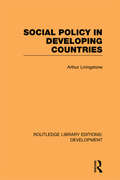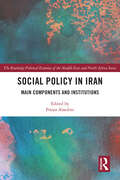- Table View
- List View
Social Policy 1830-1914: Individualism, Collectivism and the Origins of the Welfare State (Routledge Library Editions: The History of Social Welfare #1)
by Eric J EvansFirst published in 1978, this book gathers an extensive range of documents which illuminate the complex and important process by which the State in Britain has taken on increased responsibility for the health and welfare of its citizens. It uses extracts from a variety of sources, including reports, debates, speeches, articles and reviews, and commentary from leading figures of the period, such as Disraeli, Dickens, Edwin Chadwick and Churchill. The book begins with a discussion of the notion of an ‘age of laissez-faire’ in the mid-nineteenth century, and an examination of the extent to which the Liberal government embarked on a conscious policy of ‘welfarism’ between 1906 and 1914. The extracts themselves cover the entire field of social policy, including factory legislation, public health, housing, education, poverty, pensions and unemployment. This book will be of interest to those studying the history of social welfare and social policy.
Social Policy and Administration Revisited: Studies in the Development of Social Services at the Local Level (National Institute Social Services Library)
by David Donnison Michael Meacher Valerie Chapman Angela Sears Kenneth UrwinOriginally published in 1965, this standard work sets out to explore the questions: What is ‘social administration’, and how can people prepare themselves for this work? It shows the social services in continuous evolution in response to political, economic and social change, and it ends with a deeply thoughtful and thought-provoking analysis of the processes and causes of this evolution, and of the different contributions to change made by the various parties concerned. This analysis is based on the case studies presented in the book’s central chapters. Of this new version of the book, first published in 1975, Professor Donnison wrote: ‘The first three chapters of the original book have been scrapped and a new introduction to the whole subject takes their place – an introduction not only to the literature about social policy and administration but to the "point" and purpose of the subject (for students who, rightly, expect to be convinced about this before devoting their time to it). Then follow eight case studies of innovations in the work and policies of local units of the social services – including housing, education, a home help service, planning and legal aid, besides social work services. These are the original studies untouched. I have returned to each agency and found out what has happened since our original studies, adding a postscript to each, outlining the main developments since the original research, ten to twenty years ago. I don’t think anyone has ever done that before. In most cases the innovating trends we identified have gone further, often becoming national orthodoxy by now. The one (on legal aid) where unexpected developments have occurred is at least as interesting.’ Professor Donnison has added a ninth case study – of the Department of Social Administration at the London School of Economics where he was working when the original studies were made (Professor Richard Titmuss was head of the department at that time). This study traces the development of education for social workers at a seminal stage and the difficult problems which had to be resolved when major new departures occurred in this field. The chapter will be of lasting interest to historians of social work and social work education in Britain, besides throwing light on the process of innovation in social policy.
Social Policy and Aging: A Critical Perspective
by Carroll L. EstesThis groundbreaking book provides comprehensive treatment of the political economy of aging by a scholar widely credited as the founder and key thinker of this field in the US and internationally. The body of work presented in this volume, in developing this critical perspective, aims to contribute to the understanding of old age and aging in the context of problems and issues of the larger social order in the world's most advanced capitalist nation, the U.S.A.. Since Estes' first writing on the political economy of aging in 1979, there has been growing recognition and incorporation of her critical perspective as one of the major paradigms in the field of aging.
Social Policy and Migration in China (Routledge Contemporary China Series)
by Lida FanThis book explores the interactions between social policy and migration in China. Using a theoretical framework of institutional economics, Lida Fan’s discussion examines migration regulations, household registration, social welfare and insurance, employment, education, housing, medical care and industrial strategies with a view to answering the following questions: What was/is the role of social policy in migration before and after the reform period? What are the impacts of migration on the regional redistribution of human capital as a major source of regional development? What are the determinants of interprovincial migration? How can we better understand migration related policies using a social justice perspective? What migration policy options are available to achieve desired social consequences such as mitigating inequality and improving the well-being of the most disadvantaged peoples? In posing and answering these questions the book traces the vicissitude of the formation of the household registration system (hukou) and other policies accompanying the hukou system since the beginning of the People’s Republic of China. The author concludes with proposals for institutional change in China’s migration policy, advocating the desirability of social justice perspectives and its feasibility in the current socio-economic structure.
Social Policy and Planning for the 21st Century: In Search of the Next Great Social Transformation (Routledge Advances in Sociology)
by Donald G. ReidThe greatest problems facing humanity today are climate change, poverty, and the increasing separation between the rich and poor. The aim of this book is to examine the social constructions that have led to these breakdowns, and provide potential solutions that are based on a fundamental change in the structure of society and the values on which a new and better social system can be built. Unless we as a society set a drastically different course soon, human life as we know it will suffer greatly, perhaps even cease altogether. Excess consumption is becoming anti-social as the effects of global warming and increasing poverty become apparent. What, then, will form the new social values on which society replaces the present emphasis on work and material consumption that now prevail? This book’s answer to that question is accomplishment and aesthetic consumption. This proposed refocused existence will necessitate a new economic order that provides access to a livelihood beyond the market system. This groundbreaking book will appeal to students and scholars of sociology, leisure studies, political science, and social work.
Social Policy and Poverty in East Asia: The Role of Social Security (Routledge Research On Public and Social Policy in Asia)
by James Midgley Kwong Leung TangThis book looks at the role of social policy and particularly social security in addressing the ongoing challenge of poverty in East Asia despite the region’s spectacular experience of economic growth in decent decades. The East Asian miracle resulted over the last four decades in a transformation of the region’s traditional agrarian economies and significant increases in standards of living for many ordinary people. Even though it was given little attention, poverty has remained an ongoing problem. The problem became particularly evident however with the Asian financial crisis of 1997 when many low income and middle class workers became unemployed. As a result of this crisis, the need for effective social policies and social security programs were recognized. The idea that economic growth would solve the problem of poverty was increasingly challenged. Even in China today, where rapid growth has created new employment opportunities and the promise of prosperity for many, the government has recognized that the problem of poverty cannot be addressed only through economic growth but that comprehensive social policies must be formulated, and this includes the development of an effective security system.
Social Policy and Privatisation (Longman Social Policy In Britain Series)
by Mark DrakefordPrivatisation and Social Policy follows this format while addressing one of the key issues of recent years, namely the covert but undeniable impact of growing privatisation on the development and implementation of social policy. As the text demonstrates, there is no area of policy which privatisation has not affected, resulting in the gradual transfer of responsibility from the public to the private sphere in areas such as education, housing, health, social security and social services.
Social Policy and Social Change: Toward the Creation of Social and Economic Justice (Second Edition)
by Jillian A. Jimenez Eileen Mayers Pasztor Ruth M. Chambers Cheryl Pearlman FujiiThe Second Edition of Social Policy and Social Change is a timely examination of the field, unique in its inclusion of both a historical analysis of problems and policy and an exploration of how capitalism and the market economy have contributed to them. The New Edition of this seminal text examines issues of discrimination, health care, housing, income, and child welfare and considers the policies that strive to improve them. With a focus on how domestic social policies can be transformed to promote social justice for all groups, Jimenez et al. consider the impact of globalization in the United States while addressing developing concerns now emerging in the global village.
Social Policy and Social Work: An Introduction
by Jo Cunningham Dr Steve CunninghamAn understanding of social policy is crucial for social workers as it underpins and shapes the legislative framework that they work within. From safeguarding service users and enabling them to improve their lives, to protecting the most vulnerable in society, social policy also has a vital role to play within social work education. It is important therefore for students to engage critically with social policy. This book introduces policy and shows how it has changed and evolved over time, how it reflects changes in society, and how it is applied to everyday practice.
Social Policy and the City: Papers from the 1993 Conference of the Social Policy Association (Routledge Revivals)
by Helen Jones John LansleyFirst published in 1995, this volume explores the effects of social policy on cities during Conservative Party rule over the 1980s and 1990s. It identifies the place where the effects of social policies are most strikingly felt due to the concentration of populations in cities. Delving into issues including business elites, market forces, regenerating cities and poverty, this volume’s contributors make clear that there can be no ‘quick fix’ for Britain’s complex urban problems.
Social Policy and the Young Delinquent (Routledge Revivals)
by Peter BossOriginally published in 1967, Social Policy and the Young Delinquent is an account of a process: of the way in which the treatment of the child delinquent has developed from the days when a boy of nine could be sentenced to be hanged for stealing two penny worth of paint (though the sentence, imposed in 1833, was not actually carried out) to the controversies of the time concerning the desirability of replacing the legalistic and penal framework of the services for young offenders by a service more appropriate to their educational and social needs.Peter Boss deals with the development of policy relating to the young offender with sympathy and clarity. While his own views were progressive, he is at pains to point out the administrative advantages and disadvantages of each of the current proposals, and to leave the reader free to make up their own mind on issues which have no simple and easy solution. Profound changes had taken place in our attitude to delinquent children over the previous hundred years, and, as Boss makes clear, the importance and even the direction of change was not always clearly discernible at the time. Whatever the outcome of the controversy in 1967, this account of a developing process would have been of value in enabling us to stand back and take the long view of the most intractable and important problems of modern urban society.
Social Policy for Children and Families: A Risk and Resilience Perspective
by Dr Mark W. Fraser Dr Jeffrey M. JensonThe Third Edition of Jeffrey M. Jenson and Mark W. Fraser’s award-winning text, Social Policy for Children and Families, offers new evidence that a public health framework based on ecological theory and principles of risk, protection, and resilience is essential for the successful design and implementation of social policy. Written in a conversational, reader-friendly style and incorporating cutting-edge research, this carefully crafted book maps a pathway for developing resilience-based social policies. In every chapter, experts in their respective fields apply the editors’ conceptual model across the substantive domains of child and family poverty, child welfare, education, mental health, health, developmental disabilities, substance use, and juvenile justice. Recipient of the Best Edited Book Award from the Society for Research on Adolescence in 2008, the book is an ideal core text for graduate and upper level undergraduate courses and a vital resource for elected officials, policy makers, and others interested in the evolution of policies aimed at preventing problem behaviors and supporting children and families.
Social Policy for Children and Families: A Risk and Resilience Perspective (Second Edition)
by Mark W. Fraser Jeffrey M. JensonIncorporating cutting-edge research, the authors of this multidisciplinary text offer new evidence that a public health framework based on ecological theory and principles of risk and resilience is essential for the successful design of social policy. Contributing authors apply the editors conceptual model across the substantive domains of child welfare, education, mental health, health, developmental disabilities, substance use, juvenile justice, and now poverty. This is an ideal core text for graduate and upper level undergraduate courses entitled Social Policy, Advanced Social Policy, or Social Work with Children and Families in departments of social work, family studies, human services, sociology, public health, or psychology. It is also a vital resource for elected officials, policy makers, and others interested in the evolution of policies aimed at preventing problem behaviors and supporting children and families.
Social Policy for Children and Families: A Risk and Resilience Perspective
by William J. Hall Paul Lanier Jeffrey M. Jenson Mark W. FraserWritten in a conversational and applied style, Social Policy for Children and Families is an award-winning book that incorporates cutting-edge research across policy sectors in the human services. New editors William James Hall III and Paul J. Lanier, in collaboration with Jeffrey M. Jenson and Mark W. Fraser, have carefully crafted this 4th edition to include balanced coverage across areas of poverty, child welfare, education, public health, developmental challenges, substance use, immigration, juvenile justice, and gun violence. This book is an ideal core text for graduate and upper level undergraduate courses and a vital resource for elected officials, policy makers, and others interested in the evolution of policies aimed at preventing problem behaviors and supporting children and families.
Social Policy for Children and Families: A Risk and Resilience Perspective
by William J. Hall Paul Lanier Jeffrey M. Jenson Mark W. FraserWritten in a conversational and applied style, Social Policy for Children and Families is an award-winning book that incorporates cutting-edge research across policy sectors in the human services. New editors William James Hall III and Paul J. Lanier, in collaboration with Jeffrey M. Jenson and Mark W. Fraser, have carefully crafted this 4th edition to include balanced coverage across areas of poverty, child welfare, education, public health, developmental challenges, substance use, immigration, juvenile justice, and gun violence. This book is an ideal core text for graduate and upper level undergraduate courses and a vital resource for elected officials, policy makers, and others interested in the evolution of policies aimed at preventing problem behaviors and supporting children and families.
Social Policy for Children and Families: A Risk and Resilience Perspective
by Dr Jeffrey M. Jenson Dr Mark W. FraserThe Third Edition of Jeffrey M. Jenson and Mark W. Fraser’s award-winning text, Social Policy for Children and Families, offers new evidence that a public health framework based on ecological theory and principles of risk, protection, and resilience is essential for the successful design and implementation of social policy. Written in a conversational, reader-friendly style and incorporating cutting-edge research, this carefully crafted book maps a pathway for developing resilience-based social policies. In every chapter, experts in their respective fields apply the editors’ conceptual model across the substantive domains of child and family poverty, child welfare, education, mental health, health, developmental disabilities, substance use, and juvenile justice. Recipient of the Best Edited Book Award from the Society for Research on Adolescence in 2008, the book is an ideal core text for graduate and upper level undergraduate courses and a vital resource for elected officials, policy makers, and others interested in the evolution of policies aimed at preventing problem behaviors and supporting children and families.
Social Policy for Development
by James Midgley Anthony Hall'Strong social policy is essential for sustainable growth. This book is an extremely useful overview of social policy issue for policy makers and anyone who wants to understand the true roots of successful sustainable development' - Ian Johnson, Vice President for Sustainable Development, The World Bank 'Throughout the world issues of social development have now taken centre stage. There is no more comprehensive and readable guide to the choices and conflicts of this global drama. This book is essential reading for all students and practitioners of social development - and for every World Bank economist' - David Piachaud, Professor of Social Policy, London School of Economics This much-needed textbook fulfils a major gap in providing a complete up-to-date guide and introduction to the increasingly important role of social policy in the context of development processes and practice. Across a number of key sectors and areas of social policy concern, the authors accessibly introduce and explain the main conceptual debates, the most recent policy discussions, and provide applied examples to illustrate the latest developments in the social policy and planning field. Central topics covered include: - poverty - rural development - urban development - education - health - social work - social welfare - international development and cooperation. Social Policy for Development is an essential text for all students and practitioners alike seeking a deeper understanding of the issues of poverty, social exclusion and deprivation across social policy and development studies internationally.
Social Policy for Effective Practice
by Rosemary ChapinFor use as a text in foundations generalist social policy courses, either at the baccalaureate or master's level, this book examines the process of defining need, analyzing social policy, and developing new policy. A clear philosophical base and a common theoretical framework underlie the discussion of each component of the policy process. Four themes are interwoven throughout the book: the importance of thinking critically about social policy, the benefits of using the strengths perspective in policy analysis and development, the critical role social policy plays in all areas of practice, and the absolute responsibility of every social worker to engage in policy practice. Routledgesw.com now contains 6 cases; the Sanchez Case has been revised to include much more policy content. Instructor materials include extra readings, PowerPoints, test questions, annotated links, syllabi, and EPAS guidelines. The book is also customizable on Routledge Custom Gateway.
Social Policy for Effective Practice: A Strengths Approach (2nd edition)
by Rosemary ChapinFor use as a text in foundations generalist social policy courses, either at the baccalaureate or Master "s Level, this book examines the process of defining need, analyzing social policy, and developing new policy. A clear philosophical base and a common theoretical framework underlie the discussion of each component of the policy process. Four themes are interwoven throughout the book: the importance of thinking critically about social policy, the benefits of using the strengths perspective in policy analysis and development, the critical role social policy plays in all areas of practice, and the absolute responsibility of every social worker to engage in policy practice. At www.routledgesw. com/policy, you will find a wealth of resources to help you create a dynamic, experiential introduction to social work for your students.
Social Policy for Social Work, Social Care and the Caring Professions: Scottish Perspectives
by Steve J. Hothersall Janine BolgerThis revised second edition analyses social policy in Scotland since devolution in 1999 and reflects the nascent and distinctively Scottish policy agenda. Along with updated chapters, there are two new inclusions: a chapter analysing post-devolution Scotland and a chapter on the likely impacts of Brexit on and within Scotland. Providing diagrams, tables and a range of activities, the book maintains an innovative and pedagogic emphasis to introduce students to a wealth of materials, ideas and practical responses to the increasingly complex and diverse situations faced by social workers and other professionals. Part 1 of the book looks at what social policy is, how and why it is made and highlights the importance of the relationship between social policy and the law. Part 2 refers to specific themes of social exclusion, poverty and (more visible for this revised edition) austerity, considering their complex and multidimensional forms and discussing the range of policies currently extant that aim to combat such disadvantage. Part 3 provides a comprehensive overview of policy for practice, considering concepts of health inequality, mental health, older people, disability, children and families, education, substance use, criminal justice, asylum and immigration and homelessness. This book will be of interest to undergraduate and postgraduate students as well as post-qualified professionals seeking to understand the complexities of the social policy landscape in Scotland, and its influence on social work and related forms of professional practice.
Social Policy for Women in Pakistan
by Sara Rizvi JafreeThis book analyzes the different policy challenges that Pakistani women face and makes regionally relevant policy recommendations across different areas of private and public life, drawing on secondary data from nationally representative surveys and primary data from qualitative interviews. These areas include family safety, housing adequacy, food security and nutritional adequacy, environment and disaster protection, educational development, employment and formal sector inclusion, and health security. The author examines how the history, culture, and political climate of Pakistan have shaped social policy for women, interrogates gaps in social protections for women, and analyzes the limitations for past interventions. This text also looks at collaboration across South Asian countries, as well as using religion, social media, financing, and a new model of governance for comprehensive coverage and sustainable social policy for women. This book will be of interest to scholars, students, and policymakers with focus on women’s and gender studies and policy studies in South Asia.
Social Policy From The Grassroots: Nongovernmental Organizations In Chile
by Charles Downs Giorgio Solimano Carlos Vergara Luis ZunigaThe United Nations Children's Fund (UNICEF) has traditionally maintained very fruitful relationships with non-governmental organizations. The editors want to emphasize here is the significant role that these institutions play in designing and implementing programs to promote the development of children and women. This ·book is an analysis of non-go
Social Policy in Developing Countries (Routledge Library Editions: Development)
by Arthur LivingstoneThis reissue, first published in 1969, is a study of contemporary social policy in developing countries, which places the emphasis upon the human needs and requirements for social change which confront any people and any government, wherever their political and international affiliations lie, whatever their economic and social convictions may be.
Social Policy in East and Southeast Asia: Education, Health, Housing and Income Maintenance (Routledge Advances in Asia-Pacific Studies #Vol. 7)
by M. RameshSocial Policy in East and South East Asia provides the first systematic comparison of the policy sectors of income maintenance, health, housing and education in Hong Kong, South Korea, Singapore and Taiwan. It focuses particularly on the provision and financing arrangements of these four Asian newly industrialized economies and their outcomes in terms of adequacy, efficiency and equity, drawing on extensive primary research carried out by the author.Locating the importance of Asian social policies in the wake of the recent financial crisis in the region, this work provides a comprehensive analysis of the different types of welfare state in contemporary Asia.
Social Policy in Iran: Main Components and Institutions (Routledge Political Economy of the Middle East and North Africa)
by Pooya AlaediniThis book provides in-depth analyses of the main social policy components and institutions in Iran. Its focus is on the period since 1979, although many of the developments are inevitably traced back to their pre-revolutionary origins. The first part of the book investigates socioeconomic trends and institutional developments—including the significant role played by post-revolutionary para-governmental organizations in the delivery of social programs. The remaining chapters analyze the achievements and challenges of health, education, social insurance, housing, and employment policies as well as the macroeconomics of poverty.
